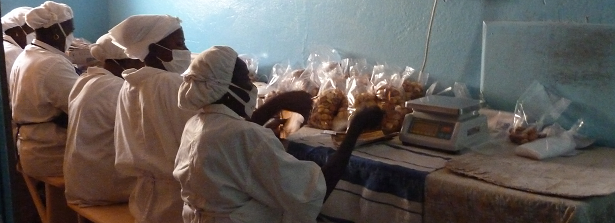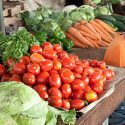A familiarizing field visit to Ouagadougou, Burkina Faso

After the visit to the project’s research sites in Kisumu, Kenya, a visit was made to our second research site in Burkina Faso, in the city of Ouagadougou, with our local team members from the university of Ouagadougou, and the Dutch PhD candidate. During this week-long familiarizing field visit for our project, “Women Food Entrepreneurs in Kenya and Burkina Faso: Building inclusive business models for food security in the city slums of Kisumu and Ouagadougou”, we visited several groups of food producers, processors and marketers.
We visited two groups of food producers. The farmers are mostly found on marginal land and their presence there is often disputed. The first group has close to 250 members, of which 70 are women. The second group, according to our contact, has only 10 members. Both groups grow a mix of lettuce, beets, strawberries, cabbage, corn, potato and a local variant of eggplant. One of the groups also sells tree seedlings to supplement their income, which is especially important during the wet season when their lands flood. The other groups’ land only floods partially during the wet season. Both groups face challenges regarding land ownership.
Three different groups of food processors were visited in Ouagadougou. Their products include maize flour, rice flour, rice couscous, maize couscous, biscuits and so on. The smallest of these three currently has 12 employees, while the largest company is currently setting up a new facility near Bobo. The two smaller enterprises produce their products in residential areas, which means a lack of space and an unstable electricity network. Obtaining business loans is difficult, which means a limitation of working capital, but also no financing for expansions even though the demand for the product exceeds the current production capacity. The larger enterprise faces similar problems in regards to capital, but they also mention the difficulty in communicating with partners in countries such as Senegal and Togo due to a lack of infrastructure.
Two different markets were visited, one focused on the wholesale of cereals, Marche de Sankareyaré, and another specialized in the selling of fruits and vegetables, Marche de vendre de fruits et legumes. The cereal market is where cereals from all over the country are sold on to both local and foreign buyers. The traders are solely men. The traders here have representatives in the different villages who buy the grains for them. Although volume and quality can vary, overall they have little problems finding supplies. The fruit and vegetable market is comprised of only women marketers. For them, supplies can become difficult to obtain when the season (November until March) ends and the harvest reserves are depleted. Storage is necessary but lacking, which means that part of the supply is lost to spoilage.
The visit was finalized with a workshop at the University of Ouagadougou on Thursday, January the 28th, which brought together representatives of the food producers, the processors and marketers. During the workshop the project was introduced and there was opportunity for all the stakeholders to familiarize themselves with the projects team, and also with one another. This resulted in a discussion on food production, transformation and marketing in Ouagadougou, after which the participants expressed the wish to be involved in the project and they expressed the hope that the project would lead to an improvement of the position of women entrepreneurs in the city. Through this visit the first steps have been made to the implementation of the research project, which aims to strengthen the position of women entrepreneurs from the city slums of Ouagadougou and enhance the food and nutrition security of vulnerable populations.
For more information, please contact , PhD candidate at Institute for Biodiversity and Ecosystem Dynamics, University of Amsterdam, and member of the research group .






